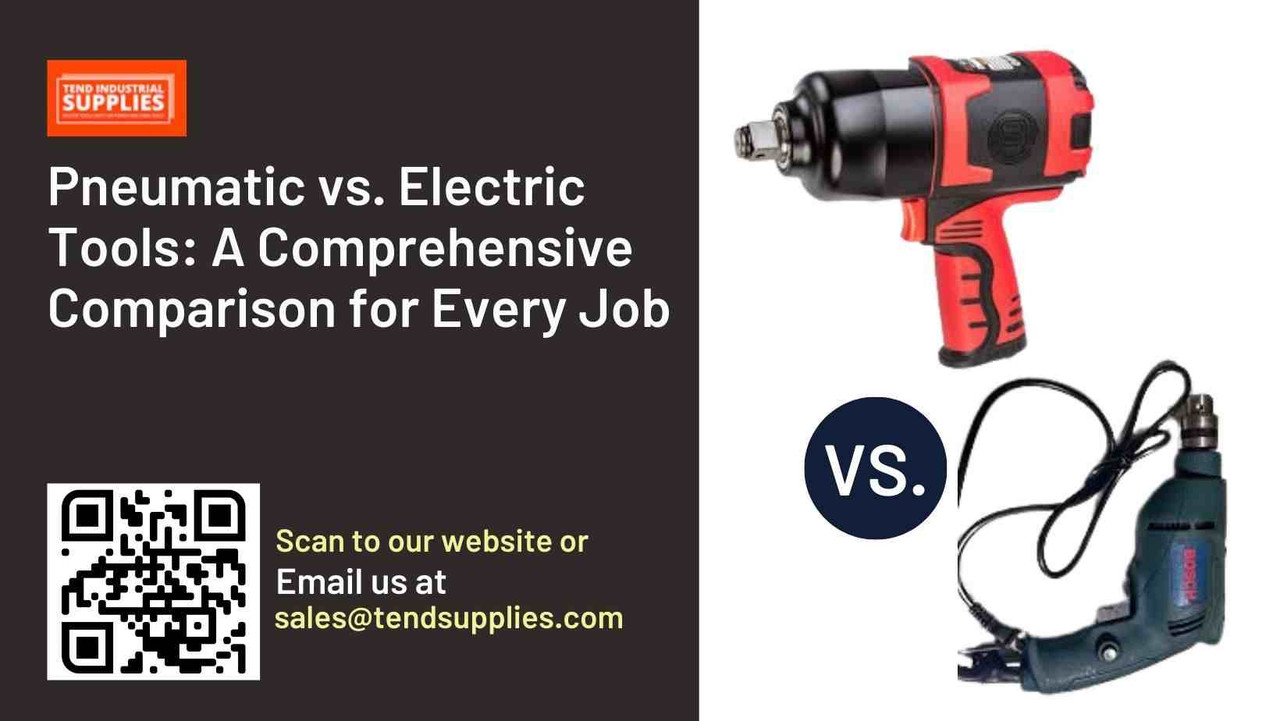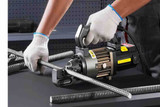Pneumatic vs. Electric Tools: A Comprehensive Comparison for Every Job
Key Takeaway
Introduction
Choosing the right power tools for your projects can significantly impact both the efficiency and quality of your work. When it comes to deciding between pneumatic and electric tools, the choice isn’t always straightforward. Each type offers distinct advantages and drawbacks, depending on the job at hand.
Pneumatic tools, powered by compressed air, are known for their durability, power, and lighter weight, making them ideal for heavy-duty tasks and industrial applications. On the other hand, electric tools, which are either corded or battery-operated, offer convenience, portability, and versatility, making them a popular choice for a wide range of DIY and professional projects. In this comprehensive comparison, we’ll explore the key differences between pneumatic and electric tools, helping you make an informed decision on which tools are best suited for your specific needs.
Understanding Pneumatic Tools
Pneumatic tools, also known as air tools, are powered by compressed air. They require an air compressor to operate, which pressurizes air and delivers it to the tool through a hose.
Advantages of Pneumatic Tools
- Power-to-Weight Ratio: Pneumatic tools often deliver more power relative to their weight, making them ideal for heavy-duty tasks.
- Durability: With fewer moving parts, air tools tend to last longer and require less maintenance.
- No Risk of Electrical Shock: Since they don't use electricity, there's no risk of electric shock in wet conditions.
- Continuous Use: Pneumatic tools can be used for extended periods without overheating.
Disadvantages of Pneumatic Tools
- Require an Air Compressor: The need for an air compressor reduces portability and increases initial cost.
- Noise: Air compressors and pneumatic tools can be quite loud.
- Limited Mobility: The air hose can restrict movement and working range.
- Moisture Issues: Compressed air can lead to moisture buildup, potentially causing rust in tools.
Explore our range of high-quality pneumatic tools
Understanding Electric Tools
Electric tools are powered by electricity, either through a cord plugged into an outlet or a rechargeable battery pack.
Advantages of Electric Tools
- Portability: Cordless electric tools offer unmatched mobility.
- Convenience: No need for an air compressor or hoses; just plug in or use the battery.
- Quieter Operation: Generally quieter than their pneumatic counterparts.
- Variety: Wide range of tools available for various applications.
Disadvantages of Electric Tools
- Power Limitations: May not match the power of pneumatic tools for heavy-duty tasks.
- Battery Life: Cordless tools are limited by battery life and may require frequent charging.
- Weight: Batteries can make cordless tools heavier than pneumatic equivalents.
- Heat Build-up: Can overheat with extended use, especially in demanding applications.
Comparing Pneumatic and Electric Tools by Application
1. Automotive Work
Pneumatic Advantage: Air impact wrenches are often preferred in automotive shops for their high torque and ability to work continuously.
Electric Option: Cordless impact wrenches have improved significantly and offer good portability for mobile mechanics.
Check out our selection of automotive air tools
2. Woodworking
Pneumatic Advantage: Air-powered nail guns and staplers are fast, powerful, and lightweight, ideal for framing and finishing work.
Electric Option: Cordless nailers offer good mobility for smaller projects or job sites without air compressors.
3. Metalworking
Pneumatic Advantage: Air grinders and sanders excel in metal fabrication due to their high speed and durability.
Electric Option: Corded angle grinders provide consistent power for extended use in metal shops.
4. Construction
Pneumatic Advantage: Air-powered jackhammers and breakers are powerful tools for demolition work.
Electric Option: Electric rotary hammers are more portable and suitable for lighter concrete work.
5. Painting
Pneumatic Advantage: HVLP (High Volume Low Pressure) spray guns powered by air compressors provide excellent finish quality.
Electric Option: Airless electric paint sprayers offer good portability and are suitable for larger surface areas.
Factors to Consider When Choosing Between Pneumatic and Electric Tools
- Power Requirements: Assess the level of power needed for your typical tasks.
- Portability: Consider how often you'll need to move around or work in areas without power outlets.
- Frequency of Use: For continuous, heavy-duty use, pneumatic tools often have an edge.
- Available Space: Air compressors require storage space, which may be a constraint in smaller workshops.
- Budget: Factor in the initial cost of tools and any necessary accessories (like air compressors or extra batteries).
- Noise Tolerance: If noise is a concern, electric tools are generally quieter.
- Maintenance: Consider the long-term maintenance requirements of each type.
Hybrid Solutions: The Best of Both Worlds
Some manufacturers now offer hybrid tools that can be powered either by compressed air or electricity. These versatile tools provide flexibility, allowing users to choose the most convenient power source for each job.
Environmental Considerations
When considering the environmental impact:
- Electric tools, especially cordless ones, rely on batteries which have their own environmental concerns regarding production and disposal.
- Pneumatic tools require electricity to run the air compressor, but the tools themselves don't contain batteries or motors.
- Corded electric tools are generally considered more energy-efficient, as they don't require battery charging or compressed air.
Future Trends
The tool industry is constantly evolving:
- Electric tools are seeing improvements in battery technology, leading to longer run times and more power.
- Pneumatic tools are becoming more efficient, with better air consumption rates and ergonomic designs.
- Smart technology is being incorporated into both types of tools, offering features like automatic shut-off and performance tracking.
Making the Right Choice for Your Needs
Ultimately, the choice between pneumatic and electric tools depends on your specific requirements:
- For a home workshop with occasional use, electric tools (especially cordless) offer convenience and flexibility.
- For professional settings with heavy, continuous use, pneumatic tools often provide the necessary power and durability.
- Many users find that a combination of both pneumatic and electric tools gives them the versatility to tackle any job.
FAQs
1. Can I use pneumatic tools without an air compressor?
No, pneumatic tools require an air compressor to function. The compressor provides the pressurized air that powers the tool.
2. Are electric tools as powerful as pneumatic tools?
While electric tools have improved significantly, pneumatic tools often still have an edge in power-to-weight ratio for heavy-duty applications.
3.How long do batteries typically last in cordless electric tools?
Battery life varies depending on the tool, battery capacity, and usage. Modern lithium-ion batteries can last anywhere from 30 minutes to several hours of continuous use.
4. Can I leave my air compressor on all the time?
It's not recommended to leave an air compressor on continuously. Most are designed for intermittent use and need cool-down periods to prevent overheating.
5. Are pneumatic tools safer than electric tools?
Both types have their safety considerations. Pneumatic tools eliminate the risk of electric shock, but they come with risks related to high-pressure air. Always follow safety guidelines regardless of the tool type.
Conclusion
The choice between pneumatic and electric tools ultimately depends on the specific requirements of your projects and work environment. Pneumatic tools excel in durability, consistent power output, and are particularly advantageous for heavy-duty, industrial tasks. They are ideal for environments where access to a steady air compressor is available. On the other hand, electric tools offer greater convenience, portability, and versatility, making them suitable for a wide range of applications, from home DIY projects to professional jobs that require mobility and flexibility. By understanding the strengths and limitations of each type, you can select the right tools that will maximize efficiency, meet your project demands, and enhance the overall quality of your work. Whether you opt for pneumatic or electric tools, ensuring that they align with the specific tasks you regularly undertake will help you achieve the best results.
Contact us for a wide range of both pneumatic and electric tools. Our expert team can help you choose the right tools for your specific needs. For personalized advice, contact us at sales@tendsupplies.com.









